征服英语
【英语作文】征服缺点

【英语作文】征服缺点
征服缺点 Conquering Imperfections
Everyone has their own strengths and weaknesses. It is human nature to have flaws and imperfections. However, the key to personal growth and development lies in our ability to recognize and conquer our shortcomings. In this essay, I will discuss the importance of conquering our flaws and share some strategies to overcome them.
我们必须认识到自己的缺点。
就像医生在诊断疾病之前需要了解病情一样,我们也需要先了解自己的缺点。
只有通过深刻的自我观察和分析,才能找出自己的真正问题所在。
我们可以问问朋友或者家人,听听他们对我们的看法。
有时候别人能够看到我们忽略的问题,给我们一些宝贵的建议。
征服的英文作文模板
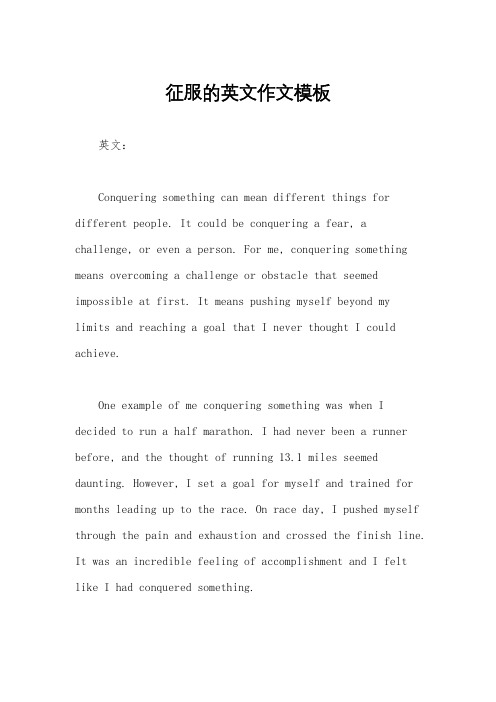
征服的英文作文模板英文:Conquering something can mean different things for different people. It could be conquering a fear, a challenge, or even a person. For me, conquering something means overcoming a challenge or obstacle that seemed impossible at first. It means pushing myself beyond mylimits and reaching a goal that I never thought I could achieve.One example of me conquering something was when I decided to run a half marathon. I had never been a runner before, and the thought of running 13.1 miles seemed daunting. However, I set a goal for myself and trained for months leading up to the race. On race day, I pushed myself through the pain and exhaustion and crossed the finish line. It was an incredible feeling of accomplishment and I felt like I had conquered something.Another example of conquering something for me was when I had to give a presentation in front of a large audience. Public speaking had always been a fear of mine, but I knew that it was something I needed to overcome in order to succeed in my career. I prepared extensively and practiced my delivery multiple times. When the day came, I felt nervous but confident. I delivered the presentation flawlessly and received positive feedback from the audience. It was another moment where I felt like I had conquered something.中文:征服对不同的人来说可能意味着不同的事情。
征服英语的17条军规
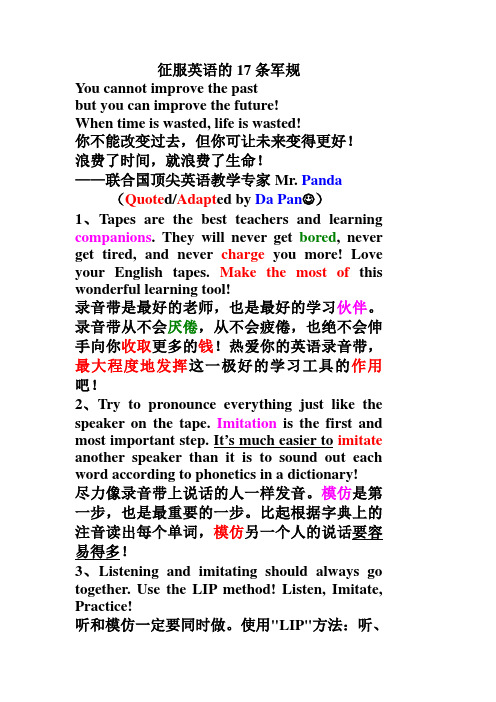
征服英语的17条军规You cannot improve the pastbut you can improve the future!When time is wasted, life is wasted!你不能改变过去,但你可让未来变得更好!浪费了时间,就浪费了生命!——联合国顶尖英语教学专家Mr. Panda(Quote d/Adapt ed by Da Pan )1、Tapes are the best teachers and learning companions. They will never get bored, never get tired, and never charge you more! Love your English tapes. Make the most of this wonderful learning tool!录音带是最好的老师,也是最好的学习伙伴。
录音带从不会厌倦,从不会疲倦,也绝不会伸手向你收取更多的钱!热爱你的英语录音带,最大程度地发挥这一极好的学习工具的作用吧!2、Try to pronounce everything just like the speaker on the tape. Imitation is the first and most important step. It’s much easier to imitate another speaker than it is to sound out each word according to phonetics in a dictionary!尽力像录音带上说话的人一样发音。
模仿是第一步,也是最重要的一步。
比起根据字典上的注音读出每个单词,模仿另一个人的说话要容易得多!3、Listening and imitating should always go together. Use the LIP method! Listen, Imitate, Practice!听和模仿一定要同时做。
vict,vinc = to conquer(征服)_英语词根大全
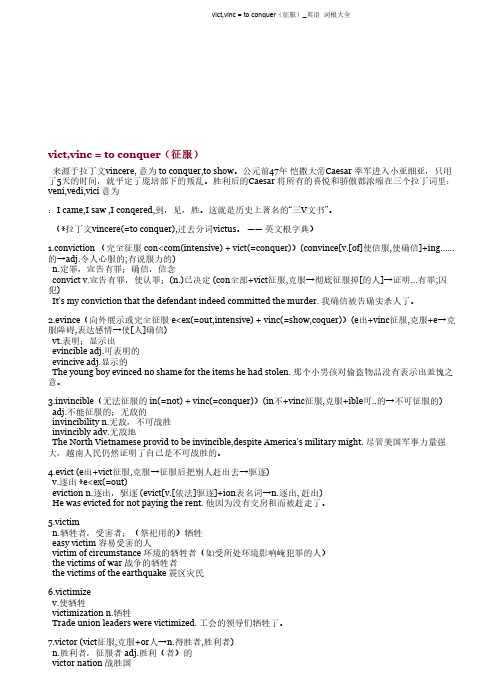
vict,vinc = to conquer(征服)来源于拉丁文vincere, 意为 to conquer,to show。
公元前47年恺撒大帝Caesar 率军进入小亚细亚,只用了5天的时间,就平定了庞培部下的叛乱。
胜利后的Caesar 将所有的喜悦和骄傲都浓缩在三个拉丁词里:veni,vedi,vici 意为:I came,I saw ,I conqered,到,见,胜。
这就是历史上著名的“三V文书”。
(*拉丁文vincere(=to conquer),过去分词victus。
—— 英文根字典)1.conviction (完全征服 con<com(intensive) + vict(=conquer))(convince[v.[of]使信服,使确信]+ing……的→adj.令人心服的;有说服力的)n.定罪,宣告有罪;确信,信念convict v.宣告有罪,使认罪;(n.)已决定 (con全部+vict征服,克服→彻底征服掉[的人]→证明…有罪;囚犯)It's my conviction that the defendant indeed committed the murder. 我确信被告确实杀人了。
2.evince(向外展示或完全征服 e<ex(=out,intensive) + vinc(=show,coquer))(e出+vinc征服,克服+e→克服障碍,表达感情→使[人]确信)vt.表明;显示出evincible adj.可表明的evincive adj.显示的The young boy evinced no shame for the items he had stolen. 那个小男孩对偷盗物品没有表示出羞愧之意。
3.invincible(无法征服的 in(=not) + vinc(=conquer))(in不+vinc征服,克服+ible可..的→不可征服的)adj.不能征服的;无敌的invincibility n.无敌,不可战胜invincibly adv.无敌地The North Vietnamese provid to be invincible,despite America's military might. 尽管美国军事力量强大,越南人民仍然证明了自己是不可战胜的。
初一征服英语参考答案上册

初一征服英语参考答案上册Unit 1: Greetings and Introductions1. 根据课本内容,如何用英语进行自我介绍?- 首先,可以说“My name is [你的名字]”来介绍自己的名字。
接着,可以加上“I'm from [你的家乡]”来说明你来自哪里。
如果愿意,还可以说“I'm 12 years old”来告诉别人你的年龄。
2. 英语中如何询问别人的姓名?- 你可以问“What's your name?”或者“May I know your name?”来询问别人的姓名。
3. 英语中如何询问别人来自哪里?- 你可以说“Where are you from?”或者“Can you tell me where you come from?”来询问别人的家乡。
4. 英语中如何询问别人的年龄?- 你可以问“How old are you?”或者“What is your age?”来询问别人的年龄。
Unit 2: Numbers and Counting1. 英语中1到10的数字怎么读?- 1 - One, 2 - Two, 3 - Three, 4 - Four, 5 - Five, 6 - Six, 7 - Seven, 8 - Eight, 9 - Nine, 10 - Ten2. 如何用英语数数?- 从1开始数,每增加一个单位就使用下一个数字。
例如,从1数到5就是“One, Two, Three, Four, Five”。
3. 英语中如何表达“第一”到“第十”?- First, Second, Third, Fourth, Fifth, Sixth, Seventh, Eighth, Ninth, TenthUnit 3: Colors and Shapes1. 英语中基本颜色的单词有哪些?- Red, Blue, Yellow, Green, Orange, Purple, Pink, Black, White, Brown2. 如何用英语描述形状?- Circle - 圆形,Square - 正方形,Rectangle - 长方形,Triangle - 三角形,Star - 星形,Heart - 心形3. 英语中如何询问某物的颜色?- 你可以说“What color is it?”或者“What's the color of this [物品]?”Unit 4: Family and Relationships1. 英语中家庭成员的称呼有哪些?- Father, Mother, Brother, Sister, Grandfather, Grandmother, Uncle, Aunt, Cousin2. 如何用英语介绍家庭成员?- 可以说“This is my [称呼], [家庭成员的名字]”。
崇拜还是征服英语作文

崇拜还是征服英语作文1When it comes to certain things in life, the question of whether to worship or to conquer often arises. Take the magnificent natural landscapes, for instance. Some people choose to worship them with awe and reverence, simply soaking in their beauty and power. They believe that nature is an unbeatable force that should be admired from a distance. However, others have a different perspective. They aim to conquer nature through technological advancements, trying to tame its wildness and extract resources for human benefits.Another example could be our attitude towards historical and cultural heritages. Some insist on maintaining a sense of worship and respect, preserving these treasures as they are, considering them as sacred legacies of the past. On the contrary, there are those who see these heritages as opportunities for innovation and conquest. They strive to incorporate modern elements and reinterpret them in new ways.In my opinion, both worship and conquest have their places. Worship helps us maintain a sense of humility and appreciation for the greatness that exists beyond our control. It nurtures our souls and reminds us of our smallness in the grand scheme of things. Conquest, on the other hand, can drive progress and bring about positive changes when done with cautionand respect. However, we must always be careful not to let the desire for conquest turn into blind arrogance or destruction. A balance must be struck to ensure that our actions are guided by wisdom and a sense of responsibility.2In the vast landscape of human endeavors, the concepts of admiration and conquest often shape our actions and destinies. Admiration can be a powerful driving force that leads us to great achievements, while an excessive pursuit of conquest may take us down a perilous path.Take the realm of sports, for instance. When an athlete holds a deep admiration for a champion, it spurs them to train rigorously, to discipline themselves, and to persevere through challenges. Their admiration becomes a source of inspiration, pushing them to reach for their own potential. However, when the focus shifts towards an obsessive desire for conquest, athletes might be tempted to resort to unethical means to gain an advantage. This not only tarnishes the spirit of the sport but also undermines the very essence of fair competition.In the academic world, the admiration of predecessors' achievements promotes the transmission of knowledge. It allows students to stand on the shoulders of giants and build upon the foundation laid by those who came before. But when the sole aim becomes conquest, disregarding the fundamental principles and accumulated wisdom, it can lead to hasty andshallow research. Such an approach might result in short-term gains but could ultimately impede the progress of knowledge in the long run.In conclusion, a balance must be struck between admiration and conquest. Admiration should fuel our passion and guide us on the right path, while conquest should be pursued with integrity and a respect for the values that underpin our endeavors. Only then can we achieve true and meaningful success.3When it comes to the relationship with English, the question of whether to worship or conquer arises. In some circumstances, worship proves to be more beneficial, while in others, conquest is the more appropriate approach.In the realm of exploring unknown scientific fields, a moderate spirit of conquest can lead to breakthroughs. For instance, scientists who dare to challenge existing theories and venture into uncharted territories often make significant discoveries. However, when it comes to the mysteries of life, a sense of worship is essential. We must respect the complexity and wonder of life, realizing that there are limits to our understanding.In the domain of artistic creation, worshiping classic works can cultivate our aesthetic sense. By immersing ourselves in the masterpieces of the past, we gain insights and inspiration. Nevertheless, having the courage to conquer traditional norms can give birth to new schools andstyles. A prime example is the Impressionist movement, which broke away from the conventions of traditional painting and opened up new horizons in the art world.In conclusion, both worship and conquest have their places. We need to discern when to adopt one over the other to achieve progress and growth in our pursuit of knowledge and creativity.4In today's society, the choice between admiration and conquest is a topic worth exploring. When it comes to business competition, for instance, admiring one's competitors allows us to learn their strengths and improve ourselves. However, blindly seeking to conquer them might lead to a mutually damaging outcome. Take the tech industry as an example. Some companies focus on emulating the successful strategies of their rivals, which leads to their own growth and development. In contrast, those that simply aim to overpower their competitors through underhanded means often face failure and setbacks.In interpersonal relationships too, the choice holds significant importance. Admiring the virtues of others can inspire our personal growth and help us build better connections. If we try to forcefully conquer or control others, it can easily destroy the relationship. For example, in a friendship, respecting and learning from a friend's kindness and helpfulness enriches the bond. But if one constantly tries to impose theirwill on the other, the friendship is likely to crumble.In conclusion, the decision between admiration and conquest is not straightforward. It requires careful consideration and a wise choice based on the circumstances. We should aim to strike a balance, using admiration as a source of motivation and avoiding the pitfalls of blind conquest. Only then can we achieve true success and build meaningful connections in both our professional and personal lives.5When it comes to the concepts of admiration and conquest, they are deeply rooted in human nature and have significant implications for our lives. Admiration often stems from the recognition of the excellence or beauty of something or someone. For instance, we may admire a great scientist for their groundbreaking discoveries that have changed the course of history. This kind of admiration is based on a sincere appreciation of the value and significance of the object of our admiration.Conquest, on the other hand, is often driven by the desire for personal achievement and the need to prove one's superiority. Take the example of an athlete who strives to break records and conquer the competition. Their motivation lies in the pursuit of victory and the validation of their skills and efforts.From a philosophical perspective, the relationship between admiration and conquest and the meaning of human existence is a profoundtopic. Admiration allows us to appreciate the beauty and goodness in the world, adding a sense of wonder and inspiration to our lives. Conquest, when pursued with a noble purpose, can lead to progress and improvement. However, when conquest becomes an obsessive pursuit at the expense of moral and ethical values, it can lead to negative consequences.In conclusion, both admiration and conquest have their place in our lives. We should cultivate a genuine sense of admiration to enrich our souls and pursue conquest with wisdom and integrity to achieve meaningful goals.。
成功征服英语20个好习惯
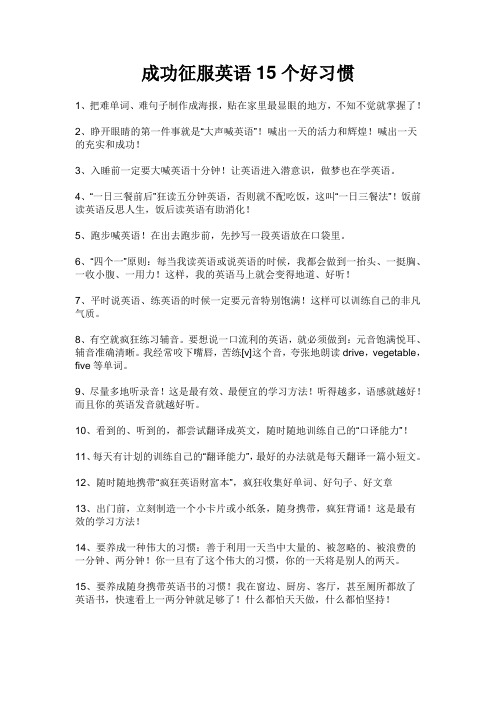
成功征服英语15个好习惯1、把难单词、难句子制作成海报,贴在家里最显眼的地方,不知不觉就掌握了!2、睁开眼睛的第一件事就是“大声喊英语”!喊出一天的活力和辉煌!喊出一天的充实和成功!3、入睡前一定要大喊英语十分钟!让英语进入潜意识,做梦也在学英语。
4、“一日三餐前后”狂读五分钟英语,否则就不配吃饭,这叫“一日三餐法”!饭前读英语反思人生,饭后读英语有助消化!5、跑步喊英语!在出去跑步前,先抄写一段英语放在口袋里。
6、“四个一”原则:每当我读英语或说英语的时候,我都会做到一抬头、一挺胸、一收小腹、一用力!这样,我的英语马上就会变得地道、好听!7、平时说英语、练英语的时候一定要元音特别饱满!这样可以训练自己的非凡气质。
8、有空就疯狂练习辅音。
要想说一口流利的英语,就必须做到:元音饱满悦耳、辅音准确清晰。
我经常咬下嘴唇,苦练[v]这个音,夸张地朗读drive,vegetable,five等单词。
9、尽量多地听录音!这是最有效、最便宜的学习方法!听得越多,语感就越好!而且你的英语发音就越好听。
10、看到的、听到的,都尝试翻译成英文,随时随地训练自己的“口译能力”!11、每天有计划的训练自己的“翻译能力”,最好的办法就是每天翻译一篇小短文。
12、随时随地携带“疯狂英语财富本”,疯狂收集好单词、好句子、好文章13、出门前,立刻制造一个小卡片或小纸条,随身携带,疯狂背诵!这是最有效的学习方法!14、要养成一种伟大的习惯:善于利用一天当中大量的、被忽略的、被浪费的一分钟、两分钟!你一旦有了这个伟大的习惯,你的一天将是别人的两天。
15、要养成随身携带英语书的习惯!我在窗边、厨房、客厅,甚至厕所都放了英语书,快速看上一两分钟就足够了!什么都怕天天做,什么都怕坚持!。
英语重点词汇beat,win,conquer,defeat,overcome解析
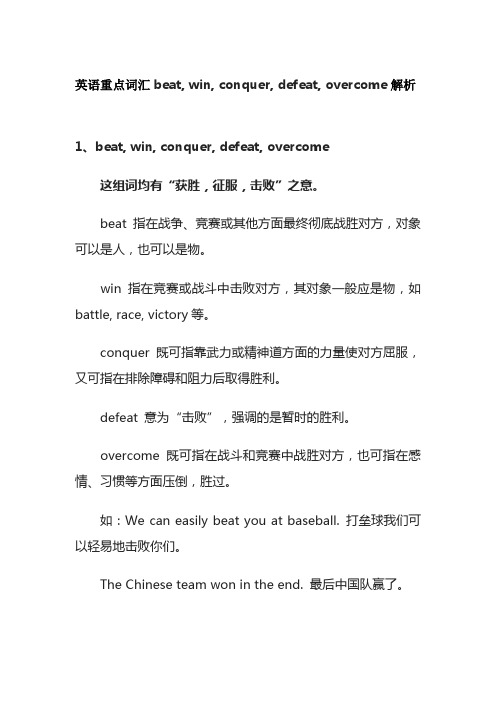
英语重点词汇beat, win, conquer, defeat, overcome解析1、beat, win, conquer, defeat, overcome这组词均有“获胜,征服,击败”之意。
beat 指在战争、竞赛或其他方面最终彻底战胜对方,对象可以是人,也可以是物。
win 指在竞赛或战斗中击败对方,其对象一般应是物,如battle, race, victory等。
conquer 既可指靠武力或精神道方面的力量使对方屈服,又可指在排除障碍和阻力后取得胜利。
defeat 意为“击败”,强调的是暂时的胜利。
overcome 既可指在战斗和竞赛中战胜对方,也可指在感情、习惯等方面压倒,胜过。
如:We can easily beat you at baseball. 打垒球我们可以轻易地击败你们。
The Chinese team won in the end. 最后中国队赢了。
The Normans conquered England in 1066. 1066年,诺曼底人征服了英格兰。
He defeated his opponents in this election. 在这次竞选中,他击败了对手。
He made efforts to overcome every difficulty. 他努力克服每一个困难。
2、award, reward这组词均含有“授予,给予”的意思。
award 意为“授予,给予”,通常指官方或法院根据规定把钱财等奖给或判给某人。
reward 意为“酬劳,奖赏”,通常指因做了某一件事或提供了某种服务而应得到的报答或酬谢。
如:He was awarded a medal for his outstanding contribution to science. 由于对科学作出了杰出贡献,他被授予一枚奖章。
He rewarded me with 30 dollars for taking him to the airport. 我把他送到机场,他给了我30美元作酬金。
- 1、下载文档前请自行甄别文档内容的完整性,平台不提供额外的编辑、内容补充、找答案等附加服务。
- 2、"仅部分预览"的文档,不可在线预览部分如存在完整性等问题,可反馈申请退款(可完整预览的文档不适用该条件!)。
- 3、如文档侵犯您的权益,请联系客服反馈,我们会尽快为您处理(人工客服工作时间:9:00-18:30)。
征服英语
对于我而言用晚读征服英语需要毅力……——题记每一个清风月朗的晚上,当微风带来丝丝凉爽时。
远远望去,有一个发亮的点……没错,那个发亮的点就是我的房间。
小小的房间里,正回荡着英语磁带发出的微妙声音。
的确,每当我听见一个个字正腔圆的英文字母从复读机里迸发出来时,我的心都会有一丝紧张。
WHY?因为我很懒,我不愿把磁带倒回来倒回去,所以每句话我都会认真倾听,模仿语音语调。
有时滑稽的声音会让自己哈哈大笑,笑过之后是满足……时间在读英语中溜走了,它并没有来无影去无踪,它给我留下的是……说起读英语,从一开始我还不是心甘情愿的呢!刚上初中,英语就拖我的后腿。
每天上课虽谈不上听天书,但也可以说是手足无措了。
我们的英语老师是一个中年妇女,她的打扮每天都会让人觉得眼前焕然一新。
最有特点的是她的教学方式,我总觉得一定是哪位魔法师教了她魔法。
不然,她怎么能将生动的故事自然地融合到课本上来;她怎么能不要我们死记死背就能把我们的书面表达变得完美无瑕;她怎么能在讲完课本的上的知识后,又为我们不厌其烦地讲解课外知识中的精华呢?
然而更多的时候,我更想对老师说;老师,你的教学方式固然是好,我也很喜欢,但你能不能用死记死背来约束我们呢,两种方法相比之下,我更喜欢第2种。
我愿意每天听写,因为我是
差生,我不得不用听写,死记死背来让我记住语法。
而您面对这些都只是一笑而过。
每一次英语测验结束后,您都会对我说:“这次有点进步,下次一定要加油。
”这样让我坚定了能学好英语的决心。
当得知读是一种很好的办法时,我试了。
每次在读的时候我就会提醒自己注意细节,每当遇到难点时,就会想起有双眼睛在看着我,她想让我进步,我就会不断为自己加油。
当然在坚持的过程中也不是一帆风顺的,有时我会觉得这是应付差事;有时我会想今天不读不会怎么样的;有时也会自暴自弃,自己已经这么差,还能怎样……每一次抱怨之后我又会继续拿起书,也许是觉得对不起自己吧!
……就这样日复一日,我的付出有了回报,我的英语成绩由倒数变为前30,前20直到现在的前12,从没走过回头路。
现在英语老师送给我的不是那句话了,而是:“还要加油啊。
”
学好英语的路程好似一次漫长的旅途,终点是珠穆朗玛峰,我要用晚读征服整个山峰,用进步来为我的期中考试画句号……依然是天上一轮月亮,地上一盏明灯。
月如轻纱般笼罩着大地,他们陪我走过每一个夜晚……。
